
September 2007
Volume 11, Number 2
| Contents | | | TESL-EJ Top |
 |
September 2007
|
||
|
| Title: | Game Show Presenter 4.3d |  |
| Product Type: | Game show-type quiz maker | |
| Publisher: | Bodine Training Games LLC | |
| Contact Info: |
8417 Hallet, Lenexa, KS 66215 USA Tel: 1-913-492-7709 URL: http://www.almorale.com | |
| Platform: | Windows and Macintosh | |
| Minimum System Requirements: | PC | Mac |
|
| |
|
15 MB disk space 800x600 or larger screen sound card speakers projector (for in-class use) Adobe Flash Player must be installed. | ||
| Price: |
Single-user license copies (downloadable): $79 each 2-5 single-user copies: $69 each 6-9 single-user copies: $65 each 10 or more single-user copies: $60 each 50-user license: $1,500 100-user license: $2,500 Price includes unlimited copies of Playback Only edition | |
| Shareware/Demo Limitations | Demo version of Game Show Presenter is fully functional; however, the words ''DEMO SHOW'' will fade in and out over the text of quiz questions. | |
Game Show Presenter 4.3d, created by Bodine Training Games LLC, was originally designed as a presentation tool that would allow any users to make information fun by presenting it in a customized TV game show-like format using multiple choice and true-false questions. The software is different from other quiz-authoring software (such as Articulate Quiz Maker, Hot Potatoes, Parapal Suite, QuizFaber, Teaching Templates Quiz Maker, and WebQuiz XP) in that it offers a fun multiple-player game option. The software is designed for educators, trainers, exhibitors, and custom project builders as "a fast and affordable way to motivate people to pay attention and learn in instructor-led trainings." It is an easy-to-use tool which helps hold the audience's attention while reviewing information, conducting quizzes, or perhaps just entertaining them. It can be a good attention grabber, especially for young learners. Below is the opening screen; this screen appears after clicking "Use Demo Mode" when the software is run.
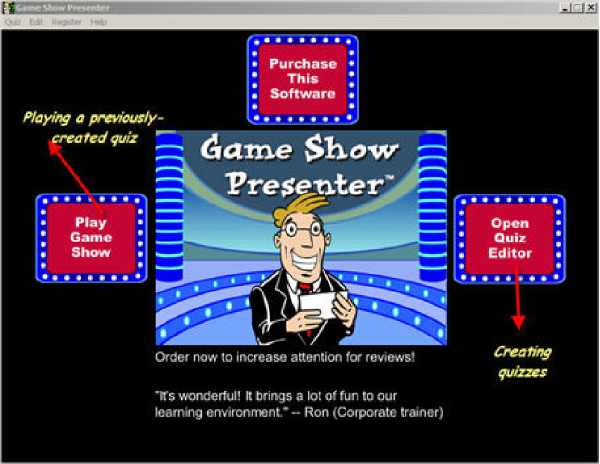
Figure 1. The default screen of Game Show Presenter
The setup file is 7.31 MB and after installation, the program takes up about 12 MB hard disk space. Installation is quick—around one minute—and easy.
From the start window in Figure 1, users have several choices. If the user is using the demo mode and has not yet purchased the software, a "Purchase This Software" button will appear at the top of the screen. The "Play Game Show" allows users to start playing a previously created game show. Finally, clicking on the "Open Quiz Editor" takes the user to a quiz editor screen (see Figure 2) that allows the user to create a new quiz or modify an existing quiz.
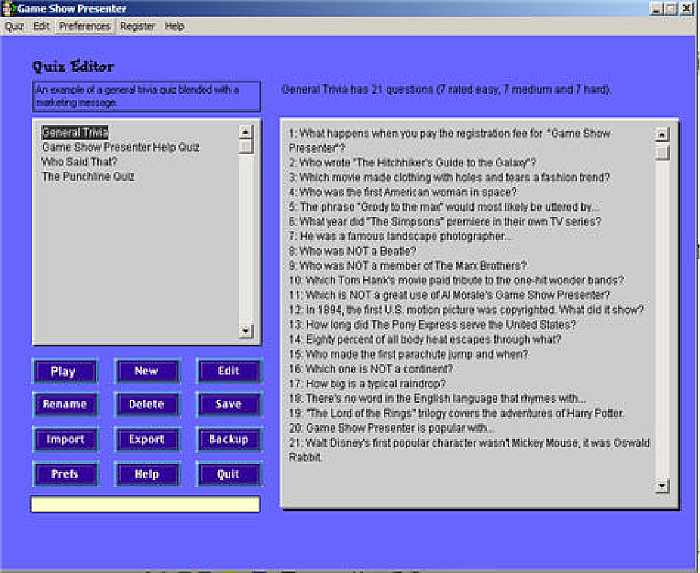
Figure 2. Quiz-editor screen.
On this screen, pre-made quizzes can be seen on the left. To create a new quiz, the user clicks on the "New" button. Upon clicking on this button, a new window will pop up asking the user to name the new quiz (Figure 3). For this tutorial, "PREPOSITIONS" is used as the name of the quiz. For the game show name, "REVISION" is used (of course any name can be given to the quiz and game show).
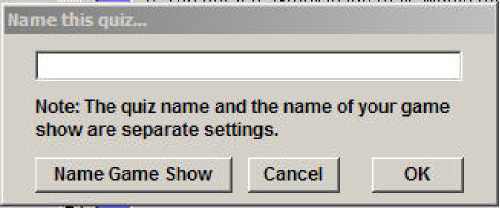
Figure 3. Naming the quiz.
Clicking on "Name Game Show" will make another screen appear (Figure 4) asking the user to choose settings such as keyboard sounds, name of the game show, and specify the number of the questions. The user can play with these settings later to modify the behavior of the game or quiz.
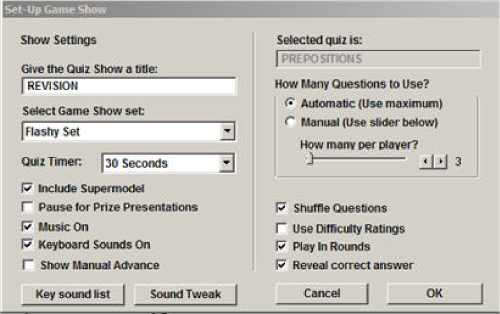
Figure 4. Setting up he game show.
After choosing the settings shown in Figure 4 and clicking "OK," the next window that appears (Figure 5) is for typing the quiz questions and answer options. The default number of options is four, but if fewer options are required (e.g., for True/False questions), the unnecessary options can be deleted by choosing the unnecessary option spaces and clicking the "Delete" button. The user sets the correct answer option by clicking on the blue letter to the left of each answer (A, B, C, or D). The software also allows the user to specify the difficulty level of the questions by choosing Easy, Medium, or Hard. The buttons for this are visible in the bottom right of Figure 7.
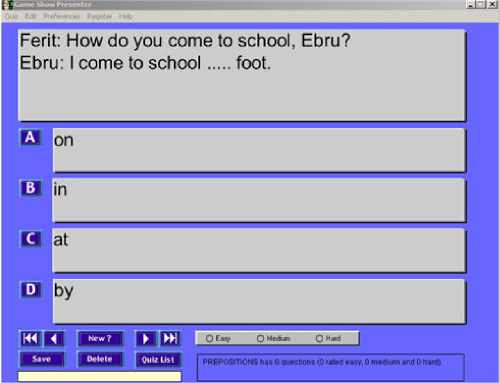
Figure 5. Typing the questions and the options.
The next step is to click on the "Save" button. If the user forgets to specify which of the options is correct, a pop-up window will appear (Figure 6) asking for the user to set the correct answer.
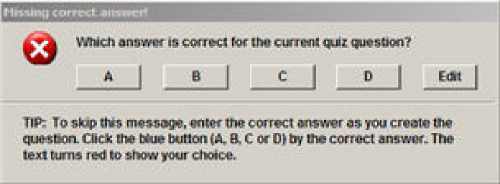
Figure 6. Determining the correct answer for the question.
After saving the first question, the user can click on the "New" button and repeat the same steps as before until the user is finished with the questions. When finished, users can edit or view their quizzes by clicking on the "Quiz List." This is the same screen previously seen in Figure 2, but now the newly created "PREPOSITIONS" quiz can be seen in the list of quizzes. Also note that on this screen, there are buttons to play, edit, rename, and save the quiz and the questions.
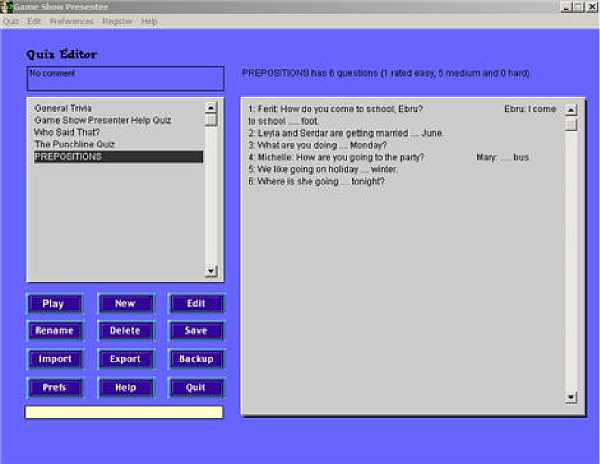
Figure 7. Quiz List.
Clicking on the "Play" button will start the show, which feature music, flashing lights and the name of the show. The presenter will appear, welcoming the audience and asking how many players will participate in the show. A female co-host will also appear and announce the scores throughout the game. The presenter asks the questions and gives motivating comments whether the correct or incorrect option is chosen. Here is an example in flash format. [Click on Figure 8 to view.]
The software's menu tool bar contains the most frequently used buttons which allows the user to use these functions easily. The functions are very clear and users will find it easy to navigate and use the program.
The software's help file is very comprehensive and detailed. It includes step-by-step instructions and provides detailed information about the software itself.
The software is very user-friendly and not much time is required to learn to use all the features. It is neither a burden for the user nor for any modern computer in terms of the hard disk space and memory requirements. It has never crashed even though the reviewers have used it extensively.
As with everything, this software has some limitations. One would be the limited types of questions available (only multiple-choice or True/False questions). It could be improved by adding exercises such as matching or fill-in-the-blank questions. Moreover, only four options are allowed for questions. Also, the unchangeable fixed voice of the presenter could be considered a limitation because the sentences vocalized by the presenter can be a little complicated, particularly for young learners. To fix this problem, future versions could allow users to add their own voices, or perhaps choose from a variety of voices.
Quizzes, tests, and exams are undeniably stressful events for many learners. Exams can sometimes become a nightmare for learners. By making use of Game Show Presenter, which does not contain any of those stressful words (test, quiz, exam, etc.) itself, language teachers may be able to encourage learners to enjoy the test or quiz. Since music and visual images are already incorporated, visual and aural learners may especially benefit from quizzes presented with this software. Ebru Çerezcioğlu, who used the software for class assignments as a student, has this to say about Game Show Presenter:
In one of my presentations, for the Advanced English Structure course, I personally experienced the fun and the pleasure of the program. As a group, we were asked to revise the content of the syllabus using some challenging questions taken from the KPDS, YDS or TOEFL exams. We determined the questions, typed them as explained in the steps above and then with the help of a projector, we played the show on the wall. The class was divided into groups to create a competitive environment. None of the classmates in the classroom seemed to notice the most important issue: They were being tested! The bonus questions, for which we promised to give presents for the correct answers, kept them alert and motivated throughout the game. As a whole, we enjoyed the session. This is especially impressive because it was the very last presentation of the semester for this course, and everybody was already tired of the presentations, including myself. In the beginning, nobody seemed to have energy for our session, but by the end we were all having great fun. All the classmates gave very positive feedback after everything was finished. They were all 4th year students in this department and they enjoyed it as one might expect young learners would.In conclusion, all language teachers should be informed about Game Show Presenter because it is a great tool for creating a funny, enjoyable, and stress-free testing environment.
Game Show Presenter (Ver.4.3d).
Executable file: http://dl.filekicker.com/send/file/155246-4X23/gameshow.exe
Compressed file: http://dl.filekicker.com/send/file/184439-5BK4/gameshow.zipA collection of downloadable quizzes for use with Game Show Presenter can be found at http://www.almorale.com/quizex.html
Other quiz programs readers may be interested in trying:
Hot Potatoes (Ver.6.2.0.9). Half-baked Software. http://hotpot.uvic.ca/setup_hotpot_6209.exe
Parapal Suite. (Ver.2.3.0). Parapal Online. http://www.parapal-online.co.uk/suite_setup.exe
QuizFaber (Ver.2.3.0). Luca Galli. http://www.lucagalli.net/cgi-bin/countdown.pl?quizfaber210eng.exe
Quizmaker (Ver.6.2.0.9). Articulate Software http://www.articulate.com/downloads/freetrial-step1.aspx
Teaching Templates Quiz Maker (Ver.2.3). TAC-Software. http://www.tac-soft.com/ttqmsetup.exe
WebQuiz XP (Ver. 2.0.40). Smartlite Software. http://www.smartlite.it/en2/download/index.asp
Ferit Kılıçkaya is a research assistant and a doctoral candidate in the Department of Foreign Language Education at Middle East Technical University, Ankara, Turkey. He holds a master's degree in English Language Teaching. His interests include computer-assisted language learning and testing, and educational technology.
Ebru Çerezcioğlu is a recent graduate of Middle East Technical University's Department of Foreign Language Education. She is interested in technology-aided language learning.
|
© Copyright rests with authors. Please cite TESL-EJ appropriately.
Editor's Note: The HTML version contains no page numbers. Please use the PDF version of this article for citations. |